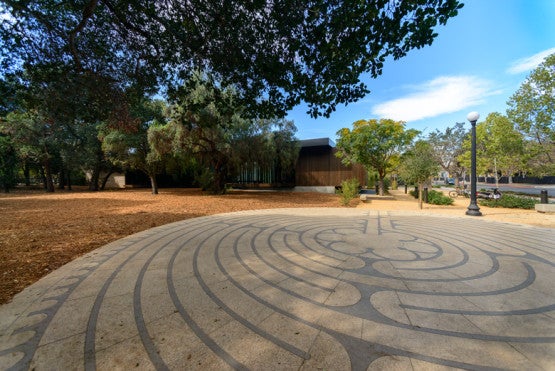Stanford encourages campus community to enjoy the ‘power of the pause’
The 2018 Contemplation by Design Summit, which will include guided meditations, a carillon concert, faculty lectures, campus contemplative walks and the creation of a sand mandala by Buddhist monks, will take place Oct. 30 through Nov. 8. All sessions are free. Registration is required.
During the 2018 Contemplation by Design Summit, which opens Tuesday, members of the Stanford community will have many opportunities to quiet their minds, engage their senses, relax their bodies and replenish their spirits through contemplative concerts, interactive workshops, talks by faculty members and guided meditations.

During the 2018 Contemplation by Design Summit, facilitators will lead walks of the labyrinth at Windhover, a contemplative center on the west side of campus, to demonstrate how the rhythm and simplicity of following a clear path can quiet the mind, restore balance, encourage prayer, and facilitate meditation, insight and celebration. (Image credit: L.A. Cicero)
All sessions of the summit, which will take place Oct. 30 through Nov. 8, are free. For more information and to register for individual sessions, visit the program’s website.
The summit will open at noon Tuesday with a workshop on practical, evidence-based contemplative skills taught by Tia Rich, director of Stanford’s Contemplation by Design, a campus-wide, multidisciplinary program designed to encourage all members of the Stanford community to enjoy “the power of the pause.”
“The summit sessions were designed to help people to pause from their extraordinary level of productivity and innovation to connect to their deepest humanity,” she said. “Faculty, staff, students and community members who participate in the summit will learn practical skills for resting, reflecting, renewing – and thus sustaining – whole-hearted, purposeful engagement in learning, teaching, research and service.”
The summit’s major events include:
- A Carillon Concert and Community-Wide Contemplative Pause, which will take place from noon to 1 p.m. on Wednesday, Oct. 31, with simultaneous gatherings in the East Oval Grove (for meditation), Dohrmann Grove (for Tai Chi), Hoover Lawn (for gentle stretching) and Meyer Green (for a picnic with a performance by Stanford Talisman, a student a cappella group).
- A keynote address by Roshi Joan Halifax, a Buddhist teacher, Zen priest, medical anthropologist and pioneer in the field of end-of-life care, titled “Standing on the Edge: Finding Freedom Where Fear and Courage Meet.” She will speak at 7 p.m. Thursday, Nov. 1, in Memorial Church.
- Ongoing viewing – registration not required – of the creation of the Compassion Buddha Sand Mandala, beginning at 9:30 a.m. Saturday, Nov. 3, in the lobby of the Alumni Center. (Check the summit schedule for viewing hours.) The mandala, which will be created by two Tibetan Buddhist monks, is a geometric figure created on a flat surface using millions of grains of colored sand. The creation of this mandala is intended to help viewers generate compassion for all beings. The closing ceremony for the mandala will be held at 4 p.m. Thursday, Nov. 8.
- A contemplative concert at Bing Concert Hall, including performances by Stanford Talisman, Chocolate Heads Movement Band, dance group Kaorihiva, and Mark Takata, a California musician who plays Native American flutes, will be held from noon to 1 p.m. on Thursday, Nov. 8.
- Guided meditation sessions – no experience is necessary to participate – will be offered weekday mornings and many evenings in locations across campus. The sessions will be led by meditation teachers representing many traditions, including mindfulness-based stress reduction, centering prayer, Christianity, Judaism, Islam, Buddhism and Hinduism.
The summit program will feature talks by faculty, including Blakey Vermeule, a professor of English and co-author of the new book, Action vs. Contemplation: Why an Ancient Debate Still Matters, Manish Saggar, assistant professor (research) of psychiatry and behavioral sciences, will talk about the neuroscience of contemplative practices, and Ronald Tyler, a professor of law, will discuss “Justice, Compassion and Self-Care.”
In a workshop on the opening day of the summit, Jonah Willihnganz, director of the Stanford Storytelling Project, will lead a workshop exploring how to use fiction and poetry to reflect deeply and create more intimacy in relationships.
The summit will also include a book discussion led by Alex Soojung-Kim Pang, author of Rest: Why You Get More Done When You Work Less, and a session on the playful gift of improvisation led by Dan Klein, a lecturer in the Department of Theater and Performing Arts and at Stanford Graduate School of Business.
During the summit, participants are also invited to engage in Daoist breathwork, in a meditative “sound bath” to the sound vibrations of singing bowls, gongs and chimes, and in yoga at Memorial Church and the Windhover contemplative center.
The Rev. Joanne Sanders, associate dean for religious life at Stanford, will facilitate several sessions, including Contemplation and Compline – an evening candlelit service of chanted song – at Memorial Church and a Walking Meditation and Contemplation of the Memorial Church Inscriptions. The inscriptions, carved into the sandstone walls of Memorial Church, were selected by Jane Stanford to provide enduring inspiration to the Stanford community.
